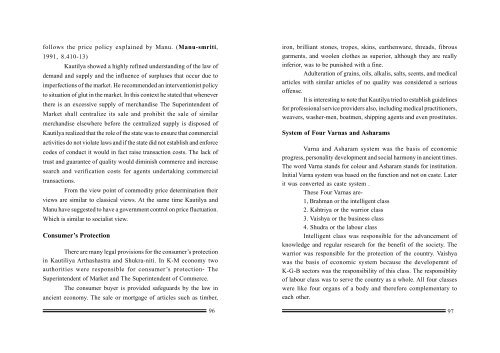Economics of Kautiliya Shukra and Brihaspati.pmd
Economics of Kautiliya Shukra and Brihaspati.pmd
Economics of Kautiliya Shukra and Brihaspati.pmd
You also want an ePaper? Increase the reach of your titles
YUMPU automatically turns print PDFs into web optimized ePapers that Google loves.
follows the price policy explained by Manu. (Manu-smriti,<br />
1991, 8.410-13)<br />
Kautilya showed a highly refined underst<strong>and</strong>ing <strong>of</strong> the law <strong>of</strong><br />
dem<strong>and</strong> <strong>and</strong> supply <strong>and</strong> the influence <strong>of</strong> surpluses that occur due to<br />
imperfections <strong>of</strong> the market. He recommended an interventionist policy<br />
to situation <strong>of</strong> glut in the market. In this context he stated that whenever<br />
there is an excessive supply <strong>of</strong> merch<strong>and</strong>ise The Superintendent <strong>of</strong><br />
Market shall centralize its sale <strong>and</strong> prohibit the sale <strong>of</strong> similar<br />
merch<strong>and</strong>ise elsewhere before the centralized supply is disposed <strong>of</strong><br />
Kautilya realized that the role <strong>of</strong> the state was to ensure that commercial<br />
activities do not violate laws <strong>and</strong> if the state did not establish <strong>and</strong> enforce<br />
codes <strong>of</strong> conduct it would in fact raise transaction costs. The lack <strong>of</strong><br />
trust <strong>and</strong> guarantee <strong>of</strong> quality would diminish commerce <strong>and</strong> increase<br />
search <strong>and</strong> verification costs for agents undertaking commercial<br />
transactions.<br />
From the view point <strong>of</strong> commodity price determination their<br />
views are similar to classical views. At the same time Kautilya <strong>and</strong><br />
Manu have suggested to have a government control on price fluctuation.<br />
Which is similar to socialist view.<br />
Consumer’s Protection<br />
There are many legal provisions for the consumer’s protection<br />
in <strong>Kautiliya</strong> Arthashastra <strong>and</strong> <strong>Shukra</strong>-niti. In K-M economy two<br />
authorities were responsible for consumer’s protection- The<br />
Superintendent <strong>of</strong> Market <strong>and</strong> The Superintendent <strong>of</strong> Commerce.<br />
The consumer buyer is provided safeguards by the law in<br />
ancient economy. The sale or mortgage <strong>of</strong> articles such as timber,<br />
96<br />
iron, brilliant stones, tropes, skins, earthenware, threads, fibrous<br />
garments, <strong>and</strong> woolen clothes as superior, although they are really<br />
inferior, was to be punished with a fine.<br />
Adulteration <strong>of</strong> grains, oils, alkalis, salts, scents, <strong>and</strong> medical<br />
articles with similar articles <strong>of</strong> no quality was considered a serious<br />
<strong>of</strong>fense.<br />
It is interesting to note that Kautilya tried to establish guidelines<br />
for pr<strong>of</strong>essional service providers also, including medical practitioners,<br />
weavers, washer-men, boatmen, shipping agents <strong>and</strong> even prostitutes.<br />
System <strong>of</strong> Four Varnas <strong>and</strong> Asharams<br />
Varna <strong>and</strong> Asharam system was the basis <strong>of</strong> economic<br />
progress, personality development <strong>and</strong> social harmony in ancient times.<br />
The word Varna st<strong>and</strong>s for colour <strong>and</strong> Asharam st<strong>and</strong>s for institution.<br />
Initial Varna system was based on the function <strong>and</strong> not on caste. Later<br />
it was converted as caste system .<br />
These Four Varnas are-<br />
1, Brahman or the intelligent class<br />
2. Kshtriya or the warrior class<br />
3. Vaishya or the business class<br />
4. Shudra or the labour class<br />
Intelligent class was responsible for the advancement <strong>of</strong><br />
knowledge <strong>and</strong> regular research for the benefit <strong>of</strong> the society. The<br />
warrior was responsible for the protection <strong>of</strong> the country. Vaishya<br />
was the basis <strong>of</strong> economic system because the developemnt <strong>of</strong><br />
K-G-B sectors was the responsibility <strong>of</strong> this class. The responsiblity<br />
<strong>of</strong> labour class was to serve the country as a whole. All four classes<br />
were like four organs <strong>of</strong> a body <strong>and</strong> therefore complementary to<br />
each other.<br />
97


